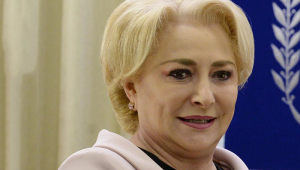Earlier this year the Romanian parliament approved a controversial overhaul of the justice system, which would soften aspects of the country’s anti-graft law and tighten political control over courts.
When the ruling social democrats announced the plans last year, the party triggered the biggest protest since its 1989 anti-communist revolution.
In a speech at the European Parliament last week, the commission’s vice president Frans Timmermans said that a strong judicial framework was “crucial” for prosecutors to investigate and judges to sentence high-level corruption.
He said: “We have seen substantial progress in the past, but things are now moving backwards in a way that would be damaging for the place that Romania has built as an EU member state in recent years.
“The reform to the judicial laws and criminal court are interlinked and it must be avoided that they have a negative impact on the independence of the judiciary and their effectiveness to combat corruption.”
The plans included changing legislation to potentially decriminalise several corruption-related offences.
Notably, the country’s president Klaus Iohannis has so far refused to sign the changes into law and has declared an interest in challenging the bill at the constitutional court.
The EU fears that Romania is going the way of Hungary and Poland, which are facing legal action from Brussels over alleged moves by their populist governments to weaken the rule of law.
Timmermans called on the Romanian authorities to conduct a “full and impartial” investigation into the plans and warned that the country could end up in court if the reforms are not reversed.
But Romanian prime minister Viorica Dancila dismissed the criticism.
She told European Parliament on Wednesday last week that Commission reports did not give the full picture.
There is “a lot of fake news floating about”, she said. Dancila added that Romanians backed her government.
Although, she did say Romania was prepared to take into consideration EU recommendations to half the legislative changes.
The Commission monitors Romania’s record on fighting corruption under the so-called Cooperation and Verification Mechanism, which the country is signed up to as part of its EU membership.
Romania is the next to take over the rotating presidency of the European Council.
Timeline - Romania’s proposed judicial changes
January 2017 – Romania’s new ruling Social Democrats party proposed an overhaul of the judiciary and easing the punishment for corrupt officials.
The proposals triggered the biggest protests since the fall of communism in the country, which forced the government to scrap an emergency decree on the definition of abuse of office – a move that some see as a way of decriminalising acts of corruption.
August 2017 – the Romanian president Klaus Iohannis and opposition parties warned that the government was attempting an attack on the rule of law
December 2017 – the Romanian Senate passes the legislation
January 2018 – Viorica Dancila was approved by the parliament as prime minister – the third since the overhaul was first announced
April 2018 – the council of Europe’s anti-corruption body warned that Romania’s plans to change judicial law and the criminal code will violate EU anti-corruption standards
July 2018 – The Romanian parliament passes the changes that partly decriminalises abuse of office, after its party head was sentenced to jail for abuse of office
The country’s president called the parliament’s move “dictatorship” and “harmful for democracy”. The president still has to sign off the reforms for them to take effect.













